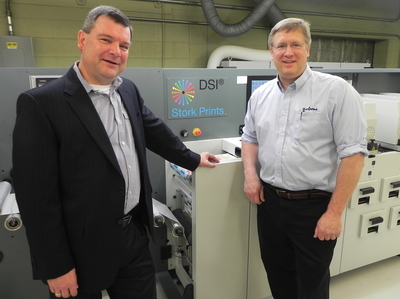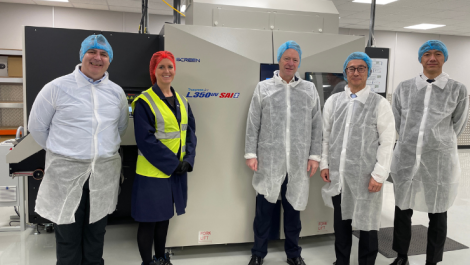(L-R) Edward Scheppink, managing director of SPGPrints America and Keith Rosenthal, VP manufacturing of McLoone
McLoone, a US-based supplier of industrial labels, decals and nameplates, has installed the SPGPrints DSI UV-inkjet label press to penetrate the mid-run self-adhesive decorative label market.
Keith Rosenthal, vice president of manufacturing, commented, ‘We sought a solution that would reduce costs and setup times when printing runs from just a few hundred units, and give us the necessary productivity to compete for orders of up to 250,000 labels. SPGPrints’ DSI press was the perfect choice thanks to its robust, ergonomic build, modular design and ability to deliver controlled quality on a wide range of plastic substrates.’
The manufacturer, previously known as Stork Prints, custom-built a 330 mm wide version of the DSI for McLoone as a stand-alone printer with CMYK plus opaque white. With speeds of up to 35 m/min, the DSI will be responsible for 25% of the company’s production, approximately half of the company’s flexible material output.
‘The DSI has given us new levels of flexibility,’ said Mr Rosenthal. ‘We can print all colours in a single pass, eliminating the logistically intensive task of printing each colour on a separate machine, and reducing the production steps from 30 to just six. We can run 20 micro-runs consecutively in less than an hour, whereas before on a screen press, this workload would have taken three days.’
At present, the DSI system prints on exclusively plastic substrates, including polycarbonates, vinyl, polypropylene and polyethylene, between 51 µm and 254 µm thick. The machine’s chill drum, which comes as standard, ensures these heat-sensitive substrates remain at a constant, cool temperature, eliminating the risk of material shrinkage.
‘A large proportion of McLoone’s DSI-printed work is identification products such as nameplates and warning labels, for electronic goods including kitchen and garden appliances. It is vital that the label graphics last the lifetime of the products they adhere to. This can be many years, during which they must withstand abrasion, sunlight, and sometimes, extreme outdoor conditions,’ said Mr Rosenthal. ‘We exposed SPGPrints’ inks, and the substrates, to numerous substances, from foodstuffs to aviation fuel, as well as accelerated weathering tests. The excellent test results gave us the assurance that the DSI and its inks could meet the most demanding customer expectations.’
The company carries out numerous finishing operations, such as lamination, embossing, doming and die-cutting, offline. The company’s stand-alone version of the DSI can be retrofitted with any AB Graphic International semi-rotary converting equipment, including laser die-cutting and up to six additional colours, at a later date.
Lynn Krenz, marketing manager, said, ‘Thanks to the DSI’s modularity, we have the freedom to expand according to our market needs, as our circumstances change, at a time that is right for us. We can respond to demand for a wider colour gamut by adding orange, violet, green or spot colours. The possibility of integrating a primer, or die-cutter, for instance, could help us diversify into printing on paper facestocks.’
That modularity extends to the integration of workflow software. Esko DeskPack workflow integrates smoothly with the company’s management information system.
The installation is opening new market opportunities. The company has strengthened its reputation as a supplier of quality-compliant industrial and safety labels by receiving Underwriter’s Laboratory accreditation for labels printed with Flexcon film on the DSI. Digital technology also brings the ability to print sequentially serialised information, increasingly demanded by OEM manufacturers.



